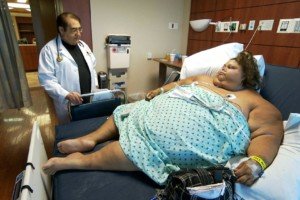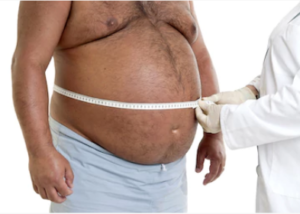
If we can’t tell a person’s health by their size, does this mean a 600 pound person can be healthy?
Does it mean a 75 pound woman can be healthy?
Does the mere absence of disease mean one is healthy?
Maybe to some, it does.
But what if that person, because of their huge size, has difficulty climbing a staircase and can’t quickly exit a chair?
How can these disabilities occur in a healthy body?
Just because we can say that a very plus-size person has normal vitals (EKG, blood pressure, A1c, lipid profile) doesn’t mean we can declare good health.
This is true of a thin person as well.
When I see a “skinny fat” woman who looks like helping a friend move would throw out her back and leave her sore and aching the next day, I don’t care how great her vitals are.

In desperate need of muscle mass. Shutterstock/Vikacita
In my opinion as a former personal trainer, I’ll think she’s unhealthy. Or maybe a better word would be “unfit.”
Thick ‘n Healthy
When the “size” is only 30 pounds overweight, but that person’s vitals are excellent, are able to lift heavy weights, dash 100 meters in under 14 seconds and run a mile in 10 minutes, this indicates that they are healthy and fit.
But why are they 30 pounds overweight (as determined by a body fat analysis rather than BMI)?
We then find out this individual’s diet is laden with big portions of processed foods full of sugar and bad fats. Day after day.
Thus, their thick build indicates over-consumption of heart-unhealthy foods.
So on one level, we can judge them by their size and say they aren’t healthy, despite being physically strong and capable.
Telling a Person’s Health by Their Size Is Very Possible

FatM1ke, CC BY-SA
A fierce argument from very large bopo influencers is that you can’t tell a person’s health by their size (even though they’re quick to point out how “unhealthy” those very thin models are).
Though one cannot say with absolute certainty that an obese person’s arteries are more than 50% blocked without a heart stress test, we can still say that a 250 pound woman or 280 pound man can’t be healthy because they can’t run (due to plus size) and can’t dash up a flight of stairs without difficulty and being breathless at the top.
These are fundamental abilities of the human body that do not require special training.
A thin person who gets wiped out running across a parking lot, likewise, isn’t the picture of health either.
With the size of obesity comes an automatic assumption, or built-in prediction, of bad health – if not now, then down the road.
“I agree,” says Susan L. Besser, MD, with Mercy Medical Center, Baltimore; Diplomate, American Board of Obesity Medicine and board certified by the American Board of Family Medicine.
Dr. Besser explains, “Extremes at either side of ‘normal’ are unhealthy. And when possible I do mention that although they [obese men and women] may feel well now, the damage is cumulative and over time their health will worsen.”
In youth, a person (thin or plus size) who engages in bad health habits is asking for big health problems down the road – but thanks to the resilience of youth, they are getting away with those habits for now.
• Overeating causing obesity
• Junk food diet though not overweight
• Smoking
• Heavy drinking
• Absence of aerobic exercise or strength training
Few people would argue that we can’t judge a thinner person’s health just because they smoke and never exercise.
Their lungs may look normal on an X-ray, and their echocardiogram may be normal, but they gasp at the top of a single flight of stairs and complain of frequent aches and pains.
These symptoms are also caused by obesity. Many people of large size insist that they’re healthy and fit, but how many of THEM actually adhere to a comprehensive workout regimen?

Shutterstock/Iam_Anupong
Nobody, big or thin, can be healthy in the absence of a clean diet and aerobic plus resistance exercise – unless your definition of “healthy” is the mere absence of sickness.
A person who huffs and puffs after rushing from one room in the house to another or struggles to get up from sitting on a floor may very well, indeed, have the absence of sickness (e.g., diabetes, hypertension, coronary artery disease, colon cancer, osteoarthritis).
But they’re winded from brief mild activity that caused their heart rate to shoot up! They are not healthy!
“When I see a morbidly obese patient, some of the obvious signs their health is poor are the following,” begins Dr. Besser.
“Poor mobility (they can’t move well due to their size — even getting up and down takes some effort); shortness of breath with limited activity — they are panting just from walking down the corridor; excessive sweating with limited activity — suggests their body is being stressed.”
“He’s thin; therefore he’s not healthy.”

The fact that many skinny people have heart disease and cancer in no way diminishes the reality that obesity is America’s second-leading cause of preventable death — right behind tobacco use (Centers for Disease Control).
“As a clinician, I also look at the patient’s blood pressure,” says Dr. Besser. “If it is elevated, that is a risk.”
This is one reason heart disease and stroke strike plenty of thin people. High blood pressure is very common in the U.S., and a major cause is poor diet. It’s a big risk factor for cardiovascular disease.
So again, when plus-size bopo influencers defensively point out that people with slender builds have heart attacks and strokes – it just does not make sense.
“And frequently, people don’t even know their pressure is elevated; they can’t feel it,” points out Dr. Besser.
“I usually will do blood tests, too, looking for diabetes, metabolic issues or liver problems. But these things can’t be determined just by looking at them.”
Is it fair to determine, just by looking at an obese person, that by the time they’re 40, they’ll be suffering from joint pain and mobility issues, not to mention feeling worked over after just playing a few minutes with the family dog?
Yes. Though there’s a very small percentage of obese individuals who hike, jog in 5Ks and even participate in triathlons, they do NOT (nowhere near it) represent the typical obese man or woman.
Doctors judge their patients’ health by their size all the time – along with by their test results as well.
A very overweight patient whose blood tests are normal, whose throat looks normal and whose heart sounds normal, will still be told by their physician about how important it is to lose weight.
 Dr. Besser provides comprehensive family care, treating common and acute primary conditions like diabetes and hypertension. Her ongoing approach allows her the opportunity to provide accurate and critical diagnoses of more complex conditions and disorders.
Dr. Besser provides comprehensive family care, treating common and acute primary conditions like diabetes and hypertension. Her ongoing approach allows her the opportunity to provide accurate and critical diagnoses of more complex conditions and disorders.
 Lorra Garrick is a former personal trainer certified by the American Council on Exercise. At Bally Total Fitness she trained clients of all ages for fat loss, muscle building, fitness and improved health.
Lorra Garrick is a former personal trainer certified by the American Council on Exercise. At Bally Total Fitness she trained clients of all ages for fat loss, muscle building, fitness and improved health.
.


























